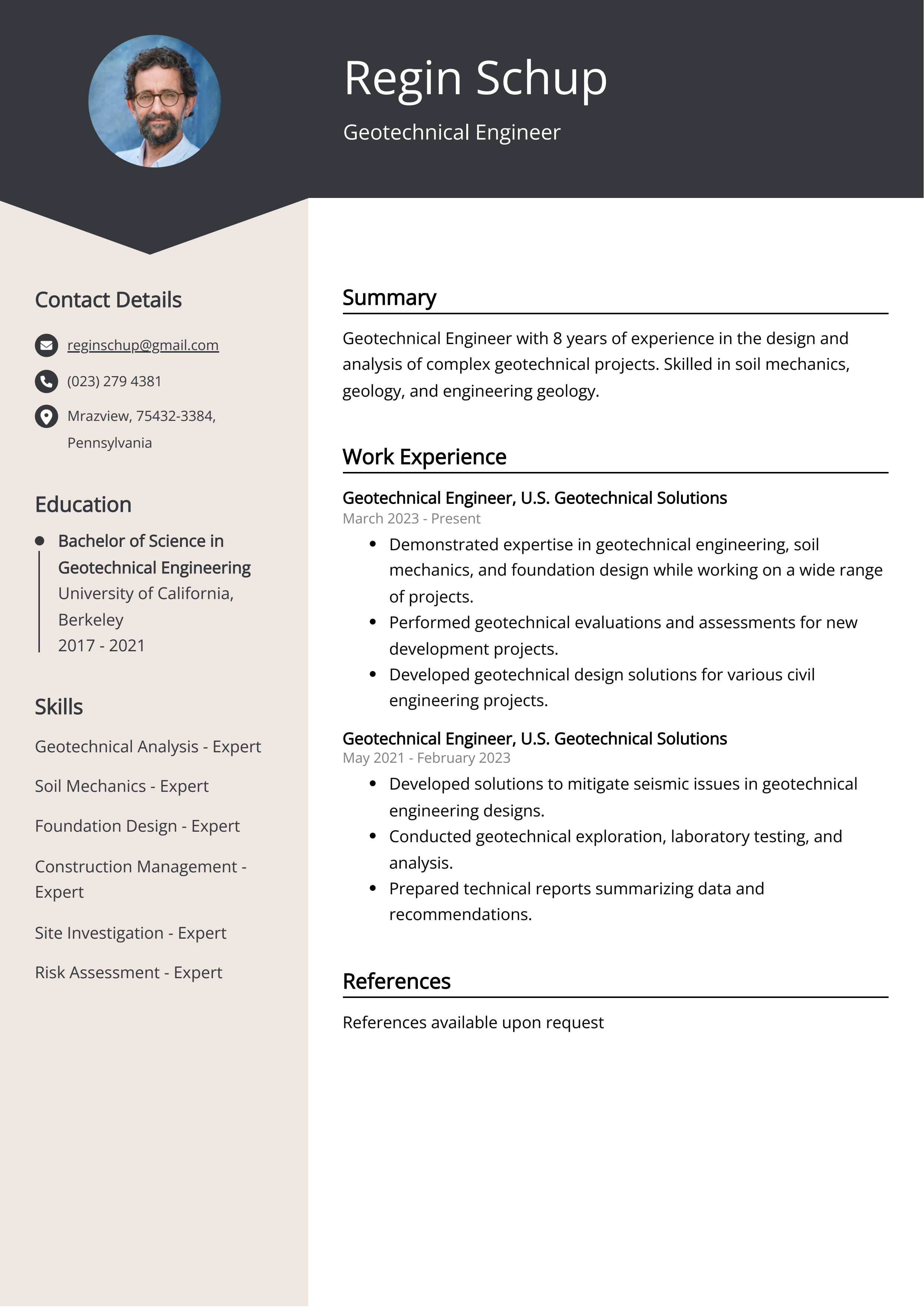Some Known Details About Geotheta
Some Known Details About Geotheta
Blog Article
Rumored Buzz on Geotheta
Table of ContentsThe smart Trick of Geotheta That Nobody is Talking AboutGeotheta - An OverviewThings about GeothetaThe Main Principles Of Geotheta The Best Strategy To Use For Geotheta

They perform website examinations, gather examples, execute research laboratory tests, and assess data to examine the viability of the ground for building jobs - Geo Tech Engineer. Based upon their findings, geotechnical engineers offer suggestions for foundation design, incline security, preserving frameworks, and mitigation of geotechnical risks. They team up with other professionals, such as architects, structural engineers, and building and construction groups, to make certain that geotechnical considerations are incorporated right into the overall task design and execution
By analyzing the behavior and properties of soil and rock, they can identify prospective geotechnical threats such as landslides, soil negotiation, or incline instability. Their expertise helps protect against failures or crashes that might endanger lives and property. Here are some detailed obligations and responsibilities of a geotechnical engineer: Website Examination: Geotechnical engineers conduct site investigations to collect information on subsurface problems.
They translate the data to recognize the residential or commercial properties and behavior of the dirt and rock, including their toughness, leaks in the structure, compaction characteristics, and groundwater problems. Geotechnical Analysis and Layout: Geotechnical designers examine the data collected throughout website examinations to evaluate the stability and viability of the website for building and construction projects. They perform geotechnical estimations and modeling to assess variables such as bearing capacity, negotiation, incline security, side earth pressures, and groundwater circulation.
Geotheta - Truths
Structure Design: Geotechnical engineers play an essential role in developing foundations that can safely sustain the intended structure. They analyze the dirt conditions and lots needs to establish the ideal foundation kind, such as superficial structures (e.g., grounds), deep structures (e.g (https://www.merchantcircle.com/blogs/geotheta-miami-fl/2024/8/Why-Geotechnical-Engineers-at-Geotheta-Are-Your-Best-Bet/2781881)., heaps), or specialized strategies like soil enhancement. They consider elements such as settlement limitations, birthing ability, and soil-structure communication to create optimum foundation layouts
They assess construction plans, monitor website activities, and carry out area inspections to validate that the design suggestions are followed. If unpredicted geotechnical concerns emerge, they examine the circumstance and give referrals for removal or adjustments to the style. Risk Analysis and Mitigation: Geotechnical engineers assess geotechnical dangers and threats linked with the project site, such as landslides, liquefaction, or dirt disintegration.

Partnership and Interaction: Geotechnical engineers work closely with various other experts entailed in a task, such as engineers, structural engineers, and building and construction teams. Reliable interaction and collaboration are necessary to integrate geotechnical considerations useful source into the overall job design and construction procedure. Geotechnical engineers supply technological competence, answer queries, and make sure that geotechnical requirements are fulfilled.
Geotheta Can Be Fun For Anyone
Here are some kinds of geotechnical engineers: Foundation Designer: Structure designers concentrate on designing and analyzing structures for frameworks. They examine the soil conditions, load needs, and site features to establish one of the most ideal foundation kind and design, such as superficial structures, deep structures, or specialized methods like pile structures.
They evaluate the variables affecting incline security, such as soil buildings, groundwater problems, and slope geometry, and establish techniques to stop incline failings and reduce threats. Earthquake Engineer: Quake engineers concentrate on assessing and developing frameworks to hold up against seismic forces. They assess the seismic threat of a site, evaluate dirt liquefaction possibility, and establish seismic style criteria to guarantee the safety and security and durability of structures throughout quakes.
They carry out field screening, accumulate examples, and evaluate the accumulated information to define the dirt properties, geologic developments, and groundwater problems at a website. Geotechnical Instrumentation Designer: Geotechnical instrumentation engineers concentrate on surveillance and measuring the habits of dirt, rock, and frameworks. They install and preserve instrumentation systems that keep an eye on aspects such as soil settlement, groundwater degrees, incline motions, and structural variations to analyze efficiency and offer early cautions of potential problems.
The 9-Second Trick For Geotheta
They carry out tests such as triaxial tests, debt consolidation examinations, straight shear examinations, and leaks in the structure examinations to gather information for geotechnical analysis and layout. Geosynthetics Engineer: Geosynthetics designers focus on the layout and application of geosynthetic products, such as geotextiles, geogrids, and geomembranes. They use these products to boost dirt security, reinforce slopes, supply drain solutions, and control erosion.
They often tend to be investigatory people, which means they're intellectual, reflective, and investigative. They are interested, systematic, rational, logical, and rational. Some of them are also social, implying they're kind, generous, participating, person, caring, practical, empathetic, sensible, and friendly. Does this audio like you? Take our cost-free career test to find out if geotechnical designer is just one of your top profession suits.
In the office environment, geotechnical designers utilize specialized software program tools to execute computations, produce styles, and examine data. They prepare reports, review task specifications, interact with clients and employee, and coordinate project activities. The workplace setup gives a favorable atmosphere for research, evaluation, and partnership with other experts entailed in the task.
Geotheta - Truths
They often go to task sites to carry out website investigations, analyze geotechnical problems, and gather data for evaluation. These brows through involve taking a trip to different locations, often in remote or difficult surfaces. Geotechnical designers might execute soil sampling, conduct examinations, and screen building and construction tasks to guarantee that the geotechnical aspects of the project are being implemented properly.
Geotechnical engineers also work in specialized geotechnical labs. Geotechnical lab designers work thoroughly in these environments, dealing with screening equipment, operating instruments, and recording information.
Report this page